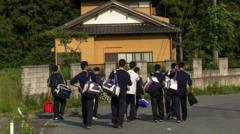A survey by the Japan Association for Sex Education indicates that an overwhelming majority of Japanese teenage boys have yet to experience their first kiss. As societal factors shift, experts worry that pandemic-related restrictions are exacerbating a declining interest in romantic relationships at a time when Japan grapples with one of the lowest birth rates globally.
Teenage Love in Jeopardy: Japan's Youth and the Declining First Kiss Statistics

Teenage Love in Jeopardy: Japan's Youth and the Declining First Kiss Statistics
A recent study reveals alarming trends among Japanese teens regarding romantic experiences, with significant drops in first kisses and sexual encounters, raising concerns about the nation's declining birth rate.
In a startling revelation, a recent survey of Japanese high school students has illuminated a concerning trend in teenage romantic interactions. According to findings by the Japan Association for Sex Education (Jase), a staggering 80% of 15- to 18-year-old boys report never having had their first kiss, with only a quarter of high school girls experiencing the same milestone. This marks the lowest recorded rates since the survey began in 1974 and poses significant implications for a nation already facing a severe decline in birth rates.
The comprehensive study, which surveyed 12,562 students from junior high schools to universities, collected data on sexual behaviors, revealing that interest in intimate relationships has plummeted over the past two decades. In 2005, approximately 50% of teenagers reported having shared their first kiss; that number has now dramatically decreased.
Sexual experiences have also seen a notable decline, with 12% of high school boys and 14.8% of girls admitting to having engaged in sexual intercourse, reflecting reductions of 3.5 and 5.3 percentage points respectively since 2017. The impact of the Covid-19 pandemic is cited as a significant factor contributing to these changes, as restrictions on school attendance and physical interactions coincided with critical developmental phases for these youth. Sociologist Yusuke Hayashi suggests that these disruptions hindered the development of romantic interests.
Interestingly, despite the downward trends in physical intimacy, the survey recorded an increase in the number of teenagers acknowledging masturbation, indicating a shift in coping mechanisms related to sexual exploration. The implications of these findings are considerable, especially as Japan grapples with longstanding challenges related to its fertility rates. The country’s demographic crisis is underscored by the alarming statistic that nearly half of all marriages in Japan are currently sexless.
With one of the world’s oldest populations—the United Nations estimates that 10% of the population is now aged 80 or older—Japan faces a potential demographic disaster, projecting a population decline from 125 million to approximately 53 million by 2100. Economic pressures, combined with evolving gender roles and greater access to contraception, are influencing reproductive choices.
In response to these trends, the government has been pressured to reassess its family policies. Companies, like diaper maker Oji Holdings, are shifting focus to adult products, reflecting the demographic climate. With Japan's birth rates hitting alarming lows, the global community is keenly observing how the nation will adapt to this significant challenge for a sustainable future.



















